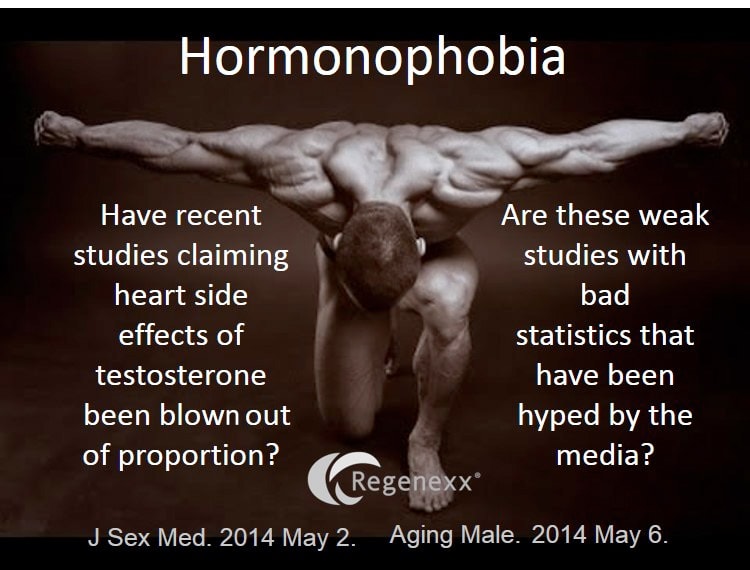Hormonophobia – Did Two New Big Studies on Testosterone Side Effects Get it Really Wrong?
Hormonophobia is a word you might not have come across yet. At the recent AMMG meeting in Orlando, the speaker who was on before I lectured went over two new studies that seemed to show that being on Testosterone caused more heart attacks. It was a really elegantly conceived and delivered presentation that basically tore apart these papers. Basically, he used Mark Twain’s adage-there are lies, damn lies, and statistics. That same speaker now has two publications that follow-up on that lecture (see pub 1 and pub 2).
Recently two large studies were published concerning an increased risk of heart attacks for patients placed on testosterone therapy. The two studies created a viral media circus and resulted in a spate of TV advertising attorneys circling like sharks smelling blood in the water. Both of the rebuttal pieces are written by an academic urologist who has been prescribing testosterone for years.
In the first testosterone-heart risk study, the percentage of patients with a side effect event was lower by half in men who received testosterone when compared with untreated men (10.1% vs. 21.2%). However, an opposite conclusion was reached via complex statistics. Basically, if you play with the numbers in just the right way, you can make it look like there are more heart attacks in men taking testosterone.
The second testosterone-heart study reported a minor increased rate of non-fatal heart attacks up to 90 days after receiving a testosterone prescription compared with the prior 12 months. However, there was no control group who didn’t get testosterone, so it is unknown whether this heart attack rate was increased, reduced, or unchanged compared with untreated men.
Neither study provided an evidence of serious risk to men, yet both were portrayed by the media as proof of dangers, despite substantial medical research that shows the opposite (a decrease in heart attacks and heart disease markers for men on testosterone). The same thing happened after the publication of the Women’s Health Initiative in 2002. At that time, female hormone replacement was pegged with causing cancer. The resulting media frenzy obscured the fact that the reported excess risk was clinically meaningless, at two events per 1,000 person-years.
So who is driving this most recent testosterone hit job? One phenomenon that may be occurring is when academic researchers get a hold of therapies that are being used in clinical practice before their blessing, they often tend to focus more on massaging data to make a point rather than on the real world benefits to patients. For example, in one of these studies, elderly men in poor health at a VA hospital were placed on testosterone without monitoring. In addition, it’s interesting that the law firm commercials soliciting heart attack clients began almost simultaneously with the press releases of these studies!
The upshot? Testosterone supplement therapy for older guys is likely here to stay. These two most recent studies don’t seem to have settled the issue of it’s safety as neither study looks like it was all it was cracked up to be by the media. In the meantime, IMHO carefully monitored testosterone therapy in middle aged men seems to have data that weighs more heavily toward it being safe than unsafe.

If you have questions or comments about this blog post, please email us at [email protected]
NOTE: This blog post provides general information to help the reader better understand regenerative medicine, musculoskeletal health, and related subjects. All content provided in this blog, website, or any linked materials, including text, graphics, images, patient profiles, outcomes, and information, are not intended and should not be considered or used as a substitute for medical advice, diagnosis, or treatment. Please always consult with a professional and certified healthcare provider to discuss if a treatment is right for you.
